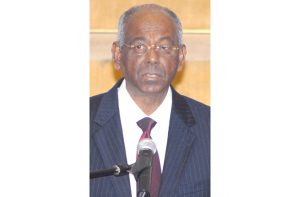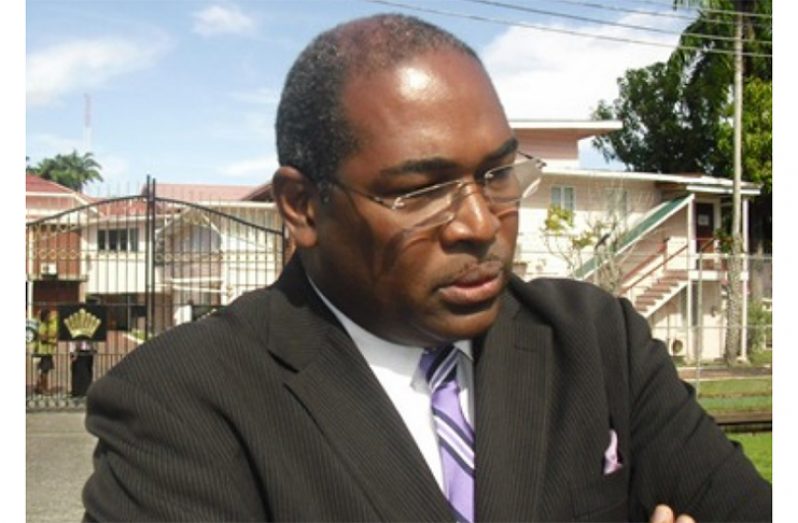…says PPP needed 34 votes
THE position that the number of votes which carried the no-confidence motion against the Coalition Government is inadequate has begun to gain momentum with more attorneys-at-law coming forward to support the theory.
Deliberations on the issue emerged on Sunday when prominent local attorney-at-law, Nigel Hughes put forward his position on social media stating: “For a no-confidence motion to pass and be valid, the motion has to enjoy more votes than one- half of the full House.”
At the time the no-confidence motion was debated and passed, there were 65 sitting members of the National Assembly present, 33 of whom were represented by the A Partnership for National Unity (APNU) + Alliance For Change (AFC). The remaining 32 belonged to the People’s Progressive Party/Civic (PPP/C).
Former AFC member, Charrandas Persaud had voted in favour of the motion, resulting in its passage.
However, Hughes is now saying that, mathematically, one-half of the House equals 32.5 members, which is highly impossible.
“There is no such thing as a half member, so half of the House is 33 members. This is because you have to round up to identify half of the House,” he said, by which he meant taking the figure to the nearest whole number.
At a media briefing on Monday, Hughes said: “To be defeated, whoever it is that brings the motion has to acquire 34 votes.”
Ralph Ramkarran, another prominent local attorney, had back in November put forward similar arguments in a Stabroek News article.
RAMKARRAN’S ABOUT-FACE
He, however, took to social media on Monday, recanting his remarks saying that he had erred, and that the opposition had in fact needed one, not two additional votes, to succeed.
Said he in retrospect: “For a no-confidence motion to succeed, Article 106(6) of the Constitution requires the vote of a majority of all the elected members of the National Assembly; 33 as against 32 is a majority.
“When I said that two votes were required for the no-confidence motion to succeed, I was obviously wrong. I meant two abstentions.”
At a press conference on Monday also, Opposition Leader Bharrat Jagdeo, the one who tabled the motion, dismissed the discussions on 34 votes being needed for majority as “mere speculations”.

He said he’s already in receipt of an official letter from the Clerk of the National Assembly stating that the matter has been passed, and that any move in another direction is simply a desperate attempt to stymie the process.
But from the tone of his presentation on Monday, Hughes seemingly no intention of changing his position much less letting up, as he cited several precedents, such as the Kliman v Speaker of Parliament of the Republic of Vanuatu; Hughes v Rogers Civil Suit 99 and 101 of 1999. Anguilla. Delivered Jan 12, 2000.
“The more important one,” he said, “is the one of Kilman against the Speaker of the House in the State of Vanuatu.
“And that is an identical case to this, where there was a vote of no-confidence, and, in effect, it was half plus one for you to get the majority.”
CLOSER TO HOME
Moving on, Hughes said: “In the case of Anguilla, closer to home, there was a case of interpreting what exactly constituted a quorum. A quorum was 1/3, I believe, and mathematically, it came up to 1/3 of a person. And Justice Saunders, who happens to be the present head of the Caribbean Court of Justice (CCJ), sitting in First Instance in that case a constitutional crisis, ruled that you have to round it up to the next number.”
Meanwhile, the law office of Attorney-at-Law Amoura Giddings, in a candid statement to the media on Monday, concurred with Hughes’ position.
According to Giddings: “The no confidence motion moved by the Opposition received thirty-three of the votes of the elected sixty-five members of the National Assembly.
“And this is not a majority vote required by this Article [Article 106 (6)]. Therefore, the effect of this Article cannot be brought into operation by the mere thirty-three votes of the elected members of the National Assembly, since it is not a majority vote as required by the Article.”
WHAT’S NEXT
Hughes told the media on Monday that with the National Assembly being an independent arm of the State, the Speaker, Dr. Barton Scotland can be invited to revisit his interpretation.
“I would imagine the Speaker, being as prudent as I know him to be, would probably seek the advice of senior counsel locally and internationally to assist him in the interpretation of that section,” the attorney said.
On the issue of whether he would be interested in taking the matter to court himself, Hughes declined, stating that the persons in power who have interest to serve will do so if they so please, as he has no interest in this regard.
Said he: “Whether the government wishes to demit office and go to elections, that’s a matter for them. I just merely wanted to state so that everybody in Guyana, at least, would have an opportunity not only to look at that section, Article 106, subsection 6, but to also look at what the authority says.
“I made a statement on my interpretation on what the legal position is in relation to a vote of no-confidence. The outcome of it I have no interest in.”
Pressed further on his scrutiny of the Constitution at such a time, when motions have been carried by the government’s one- seat majority for years, Hughes said:
“I have put forward my position; I have supported it by arguments. Those who think those arguments are silly or not worthy are entitled, of course, to their opinion, and I respect their opinion.”
He, however, said that apart from matters settled in Parliament: “The forum in which we determine these issues is the court.”



.jpg)








